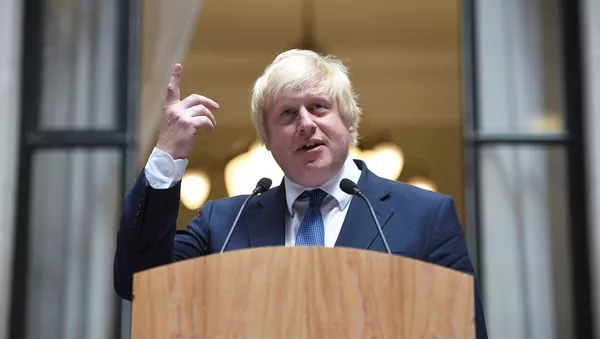The appointment of Boris Johnson — the flamboyant former mayor of London and no silver tongued orator — as the country's Foreign Secretary has caught many by surprise.
Pleasure to address UK diplomats tasked w/ forging a Britain even more engaged w/ the world. Thanks for warm welcome pic.twitter.com/uUVuHDWeA1
— Boris Johnson (@BorisJohnson) 14 июля 2016 г.
Indeed, the Conservative politician, a Brexiter and an outspoken Euroskeptic, is a person who can be hardly described as diplomatic.
What is even more eye-catching is that Johnson is known for his "pro-Kremlin" remarks in regard to Russia's military operation in Syria.
Following the Palmyra liberation Johnson wrote in his Op-Ed for the Daily Telegraph:
"It has been Putin who with a ruthless clarity has come to the defense of his client, and helped to turn the tide. If reports are to be believed, the Russians have not only been engaged in air strikes against Assad's opponents, but have been seen on the ground as well. If Putin's troops have helped winkle the maniacs from Palmyra, then (it pains me to admit) that is very much to the credit of the Russians. They have made the West look ineffective; and so now is the time for us to make amends, and to play to our strengths."
"This is the time to set aside our Cold War mindset. It is just not true that whatever is good for Putin must automatically be bad for the West. We both have a clear and concrete objective — to remove the threat from Isil [Daesh]. Everything else is secondary," the politician stressed.
Furthermore, in his May speech on the European Union at the headquarters of the Vote Leave campaign the politician openly lambasted the EU's inconsistent foreign policy for the ongoing crisis in Ukraine, in stark contrast to the West's "common belief" that it is Russia who bears the responsibility for the crisis:
"What worries me now is that it is the European Union's pretensions to run a foreign policy… We saw what happened in Bosnia. We've seen what happened in the Ukraine… All the EU can do in this question, in my view, is cause confusion and, as we've seen in the Balkans and in the Ukraine things went wrong as well," he underscored.

Unsurprisingly, Johnson was immediately labeled a "Putin apologist" by his political opponents, most notably, Sir Jack Straw, former Labor foreign secretary.
So will the appointment of Johnson bring London and Moscow closer to each other?
London-based political analyst Alexander Mercouris believes that British Prime Minister Theresa May's appointment of Johnson as Foreign Secretary "gives grounds for limited optimism that the ultra-hardline against Russia, which Britain has been following, may be coming to an end."
"That was a very courageous and difficult step for Theresa May to take at the time, exposing her to charges that she was covering up for Putin and Russia, and it suggests that if nothing else she has an open mind and does not share in the pathological Russophobia of much of the rest of the British establishment," the political analyst writes in his opinion piece for The Duran.
However, Mercouris adds that since British policy remain "anchored" in the US and NATO alliance, one should not expect drastic shifts in the UK's foreign strategy.
In his article for RIA Novosti Vladimir Ardaev, a Rossiya Segodnya International Information Agency observer, notes that the UK is preparing to withdraw from the EU to conduct more independent foreign and domestic policy.
"The new Foreign Secretary's views could hardly be called pro-Russian, but there's no denying that the flamboyant British politician is reasonable," Ardaev remarks.
Still, the journalist cites Evgeny Minchenko, the President and Chief Executive Officer of MINCHENKO CONSULTING Communication Group, who expresses doubts that the UK's foreign policy course toward Russia would undergo significant changes in the near future.
"Russia will be a matter of "secondary importance" for [the UK's] Foreign Office. Brexit has become the main issue of the British foreign policy agenda and the new minister's major focus," Minchenko explained.
As for Johnson's statements in regard to Russia, the expert believes that they were just part of Johnson's struggle for leadership in the British Conservative party.
Here's my first day remarks earlier to mediahttps://t.co/bSw3htGRed
— Boris Johnson (@BorisJohnson) 14 июля 2016 г.
Dr. Alexander Orlov, Director of the Institute for International Studies (IIS) of MGIMO University, told RIA Novosti that there is a slim chance that Britain will carry out more independent foreign policy after Brexit.
"In the past fifty years the US and Great Britain have closely coordinated their actions on the world arena, let alone the EU affairs. Boris Johnson has a rather interesting personality, very uncommon for the British establishment. And it is not because of his flamboyance, but because of his rather independent behavior. Theoretically, we may expect some sudden steps on his part, including those benevolent [to Russia]. But [this possibility] is still only theoretical," Orlov emphasized.
Curiously enough, Johnson is by no means the man-of-the-people. The representative of the British wealthy upper class, Alexander Boris de Pfeffel Johnson is a descendant of King George II, like his eighth cousin David Cameron.
Johnson and Cameron "descend from King George II (1683-1760) — albeit by illegitimate lines… Boris is a descendant of Adelheid, Baroness de Pfeffel (his full name is Boris de Pfeffel Johnson), an illegitimate daughter of Prince Paul of Württemberg, himself a great-great-grandson of King George II," Alex Cox of Findmypast.co.uk research website revealed on July 12, 2016.
Regardless of the controversy sparked by Johnson's appointment, his biographer Andrew Gimson wrote in his Op-Ed for the London Evening Standard:
"May has given him [Johnson] the great office of Foreign Secretary. There is every chance it will prove a brilliant stroke… No one has a better chance of making our foreign policy audible and acceptable, by harmonizing it with the best instincts of the British people."




